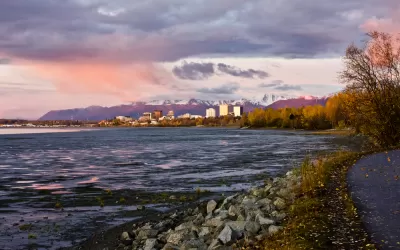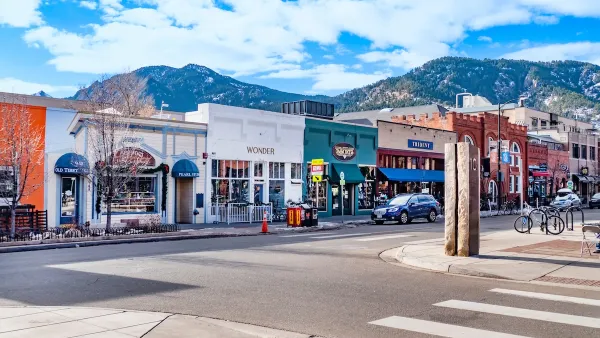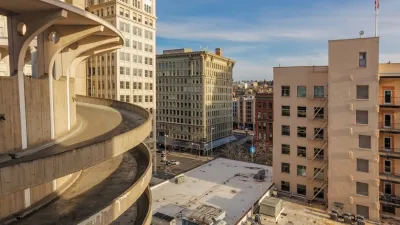With an average of eight parking spots per one car, U.S. cities have a glut of parking. How can valuable urban space be used more effectively?

In an opinion piece for the Anchorage Daily News, Kevin Cross, Amanda Moser, Eric Visser, Daniel Volland and Emily Weiser argue that, like many other U.S. cities, Anchorage has a parking problem. That is, there is too much of it.
According to the authors, “Excessive parking obstructs housing development, impedes adaptive reuse of buildings and hinders the creation of vibrant spaces that allow our community to flourish and feel connected.” They attribute this in part to the parking minimums included in the city’s municipal code, which call for unnecessarily high numbers of parking spots for many uses.
Parking overbuilt to a level far exceeding normal usage creates vast swaths of empty space. Less land is available for development that adds value to our city. It is, therefore, worth exploring whether we should require minimums at all.
The article argues that eliminating parking minimums won’t affect existing parking, will still allow developers to include as much parking as is appropriate for their projects, and will have only small, incremental effects on on-street parking. Pointing to an example from Portland, Oregon, the authors write that “Parking minimums raise the cost of housing when Anchorage has a critical need for affordable and middle market-rate housing. They make multi-family housing developments more expensive and often impossible to build.”
To cement their case against minimum parking requirements, the authors note that the requirements put a disproportionate burden on small entrepreneurs who want to rehabilitate old buildings, decrease walkability, and slow housing construction. “In the absence of parking minimums, we’ll still have parking— but we’ll be free to decide how much it’s worth to us and weigh its value against the other things we could do with the same finite, precious land.”
FULL STORY: Anchorage has a parking problem — but maybe not the one you think

Planetizen Federal Action Tracker
A weekly monitor of how Trump’s orders and actions are impacting planners and planning in America.

Chicago’s Ghost Rails
Just beneath the surface of the modern city lie the remnants of its expansive early 20th-century streetcar system.

San Antonio and Austin are Fusing Into one Massive Megaregion
The region spanning the two central Texas cities is growing fast, posing challenges for local infrastructure and water supplies.

Since Zion's Shuttles Went Electric “The Smog is Gone”
Visitors to Zion National Park can enjoy the canyon via the nation’s first fully electric park shuttle system.

Trump Distributing DOT Safety Funds at 1/10 Rate of Biden
Funds for Safe Streets and other transportation safety and equity programs are being held up by administrative reviews and conflicts with the Trump administration’s priorities.

German Cities Subsidize Taxis for Women Amid Wave of Violence
Free or low-cost taxi rides can help women navigate cities more safely, but critics say the programs don't address the root causes of violence against women.
Urban Design for Planners 1: Software Tools
This six-course series explores essential urban design concepts using open source software and equips planners with the tools they need to participate fully in the urban design process.
Planning for Universal Design
Learn the tools for implementing Universal Design in planning regulations.
planning NEXT
Appalachian Highlands Housing Partners
Mpact (founded as Rail~Volution)
City of Camden Redevelopment Agency
City of Astoria
City of Portland
City of Laramie





























